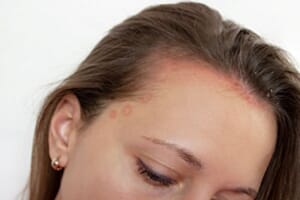Find out how to protect your sensitive skin with our winter skincare tips
Your skincare routine may need to change during winter if you suffer from sensitive skin. Sensitive skin can be caused by a number of different factors, and sometimes not always the same ones. If you have sensitive skin, it’s likely that you may be suffering from perhaps more than one condition that can trigger sensitive skin problems, especially during the colder months. Find out the ways you can protect your sensitive skin with our winter skincare tips.
Here’s how to protect and treat your sensitive skin with our winter skincare tips:
1. Winter Skincare Tips for eczema
Autumn and Winter are the typical times for eczema to flare up because we tend to start wearing heavier clothing and staying indoors more. Sweat and irritation from heavier clothes are a common trigger to flare ups. Eczema is most common in children, but unfortunately, some cases of eczema persist into adulthood. In a survey undergone by Allergy UK, it showed that 88% of patients said that the management of this condition affects their everyday life.
How to treat eczema during winter
While there is no definitive cure, doctors often prescribe topical or oral steroids to treat eczema. However, the use of steroid creams and products is only recommended for short term use. You can do your part at home by starting with a gentle daily skincare regimen in the colder months that includes daily use of non-steroid products to relieve itchiness and dryness and prevent yourself from scratching.
Skin Shop’s Hydrosil Dry Skin Gel contains Cardiospermum, which is a plant that helps to calm irritated and itchy skin. This gel is a lightweight and non-sticky gel that brings immediate relief to areas affected by eczema.
2. Winter Skincare Tips for Rosacea
The colder months are a common time for rosacea flare-ups. Rosacea is a sensitive skin condition that causes permanent redness across the nose and cheeks and small pussy rash-like spots and dryness. Sudden changes in temperature, wind and stress are all triggers for rosacea, as is spicy food and alcohol, in particular red wine. Autumn/ Winter are times of heightened stress, dramatic temperature changes and changes in diet, making it a prime time for rosacea flare ups. Rosacea is often mistaken for acne; however, typical acne treatment products can make rosacea symptoms worse.
How to treat rosacea during winter
Our Kalme skincare range is designed for people who struggle with skin conditions like rosacea. Start treating rosacea before the weather turns even colder and help to get your skin under control before the weather takes over. It’s a good idea to start treating your skin now before the Christmas season kicks in, where typically dramatic changes in diet and increased alcohol consumption can add to the problem.
Introduce Skin Shop’s Kalme Day Defence Cream into your skincare routine, which has been featured on the Daily Mail. Our gentle and moisturising cream contains caper extracts that helps combat symptoms of rosacea.
3. Winter Skincare Tips for Psoriasis
Psoriasis is an autoimmune disease caused by the overproduction of skin cells. The most common type is plaque psoriasis, which is characterized by raised red patches and silver or white scales that build up and flake off. Psoriasis is made worse by heightened stress levels and the onset of Autumn and colder months are associated with back to school and Christmas stress.
How to treat psoriasis during winter
While medical steroid treatments do work by reducing inflammation, long-term use can cause more harm than good. Steroid creams can cause premature skin thinning, stretch marks and spots.
We recommend using milder options that contain salicylic acid or coal tar. While there is no definitive cure for psoriasis, it’s likely that combinations of treatments that work best for psoriasis. Daily use of milder no-steroid anti-plaque moisturisers for your skin along with the consumption of daily fish oil supplements can significantly improve psoriasis symptoms.
Skin Shop’s Oregon Intensive Serum is a conditioning serum that treats small patches of sore, red and scaly skin that take that little bit longer to improve. Psoriasis is a skin condition that needs to be managed on a daily basis rather than only treated during flare ups.
4. Winter Skin Tips for Acne
Acne is also another skin condition that is worse during the winter, the damper climate combined with stress can wreak havoc with acne. Believe it or not, acne skin is also sensitive. Many acne sufferers treat their acne by using harsh treatments that not only dry up the skin, but cause more redness and discomfort.
How to treat acne during winter
The best way to treat acne is to maintain a healthy daily skincare regimen that includes a cleanser, moisturiser and treatment products. Skin Shop’s Clarol Skincare range is made up of gentle and natural products that do not contain any harsh chemical agents. Our Silver Serum is a ‘smart’ anti-bacterial skin treatment that contains a silver ingredient that helps to feed good skin bacteria, whilst killing the bad.
Our Final Thoughts about Treating your Skin throughout Winter…
So while you may not be able to cure your skin condition or prevent symptoms from returning, you are in control of how you care for your skin, which can make a big difference in the health and look of your complexion during the colder months. If you start following our winter skincare tips now, by the time you get to Christmas and New Year, your sensitive skin should be under control.







